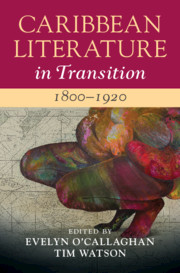Book contents
- Caribbean Literature in Transition, 1800–1920
- Caribbean Literature in Transition
- Caribbean Literature in Transition, 1800–1920
- Copyright page
- Contents
- List of Illustrations
- Contributors
- Acknowledgements
- Introduction
- Part I Literary and Generic Transitions
- Chapter 1 Conquest Narratives
- Chapter 2 Creole Testimonies in Caribbean Women’s Slave Narratives
- Chapter 3 Jonkanoo Performances of Resistance, Freedom, and Memory
- Chapter 4 Caribbean Picturesque from William Beckford to Contemporary Tourism
- Chapter 5 From Novels of the Caribbean, to Caribbean Novels
- Chapter 6 Early Caribbean Poetry and the Modern Reader
- Chapter 7 Towards a West Indian Romance Poetics
- Part II Cultural and Political Transitions
- Part III The Caribbean Region in Transition
- Part IV Critical Transitions
- Bibliography
- Index
Chapter 2 - Creole Testimonies in Caribbean Women’s Slave Narratives
from Part I - Literary and Generic Transitions
Published online by Cambridge University Press: 16 December 2020
- Caribbean Literature in Transition, 1800–1920
- Caribbean Literature in Transition
- Caribbean Literature in Transition, 1800–1920
- Copyright page
- Contents
- List of Illustrations
- Contributors
- Acknowledgements
- Introduction
- Part I Literary and Generic Transitions
- Chapter 1 Conquest Narratives
- Chapter 2 Creole Testimonies in Caribbean Women’s Slave Narratives
- Chapter 3 Jonkanoo Performances of Resistance, Freedom, and Memory
- Chapter 4 Caribbean Picturesque from William Beckford to Contemporary Tourism
- Chapter 5 From Novels of the Caribbean, to Caribbean Novels
- Chapter 6 Early Caribbean Poetry and the Modern Reader
- Chapter 7 Towards a West Indian Romance Poetics
- Part II Cultural and Political Transitions
- Part III The Caribbean Region in Transition
- Part IV Critical Transitions
- Bibliography
- Index
Summary
Since the seventeenth century, the Caribbean existed in the European imagination as a place of unfreedom, in opposition to European enlightenment and liberty. But the voices of the enslaved in the Caribbean, which are often tucked away in the writings of others, such as spiritual and conversion narratives, abolitionist speeches and portraits in ‘manners and customs’ accounts, or more ephemeral narrative fragments – offer a more complicated picture. Compared to the United States, far fewer texts that conform to the slave narrative genre survived from the Caribbean, and virtually all are mediated by a white amanuensis. This essay argues that despite this mediation, the slave narrative can be understood as dialogic, as a combined effort. Grounded in the notion of ‘creole testimony’ – a hybrid version that combines written with oral input and insists on reading against the grain to hear the subaltern’s voice – this essay demonstrates the utility of this strategy through reading several narratives by enslaved Caribbean women.
Keywords
- Type
- Chapter
- Information
- Caribbean Literature in Transition, 1800–1920 , pp. 34 - 51Publisher: Cambridge University PressPrint publication year: 2021

